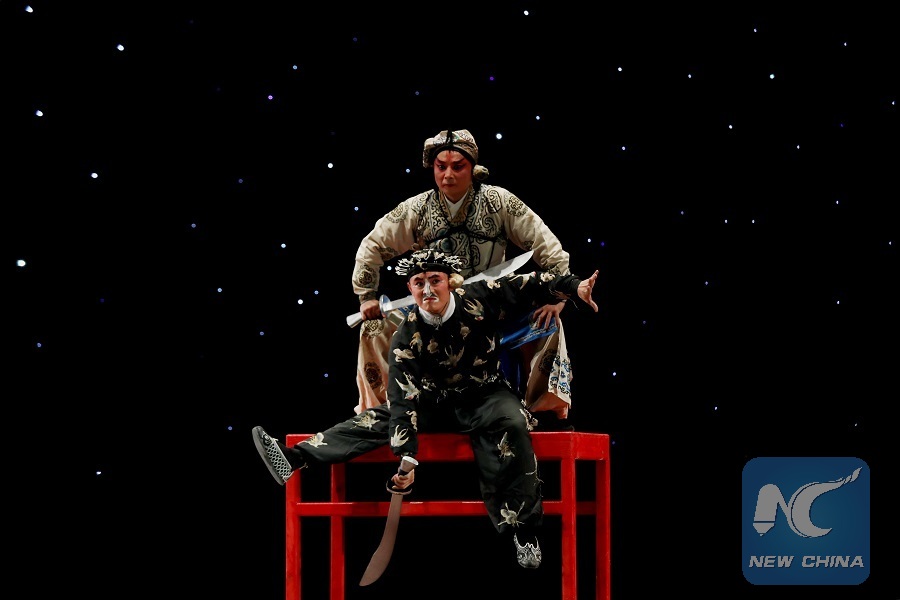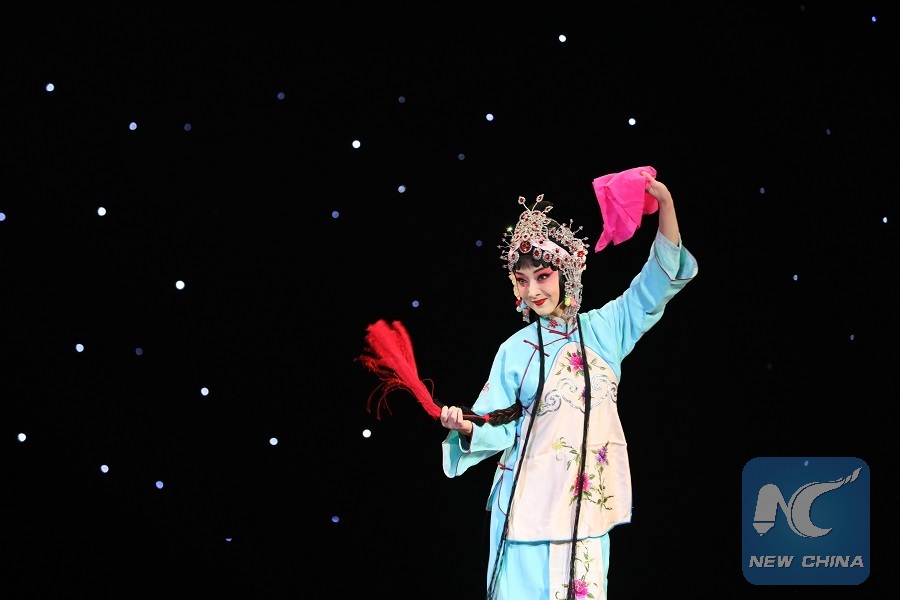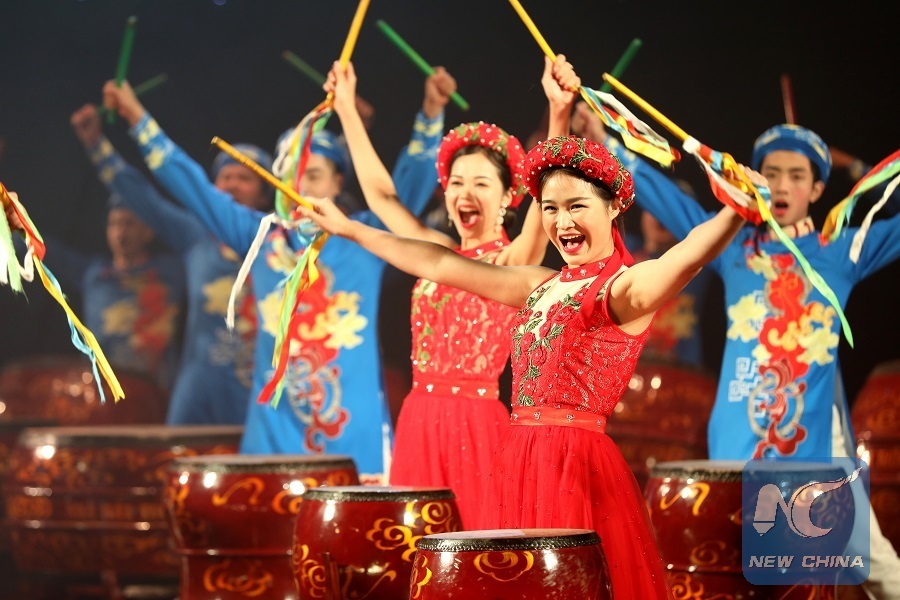
Chinese artists perform during a joint performance by both Chinese and Vietnamese traditional stage artists in Vietnam's capital Hanoi, Dec.13, 2018. (Xinhua/Wang Di)
by Tao Jun, Bui Long
HANOI, Dec. 15 (Xinhua) -- When two heavily made-up Chinese men were fighting with each other fiercely yet quietly in the darkness, using machetes and bare hands on stage in Vietnam on Thursday night, audience either clapped their hands enthusiastically or burst into laughter.
The two men were performing San Cha Kou, or The Crossway, one of classical pieces of Peking Opera which was recognized as a world intangible cultural heritage by the United Nations Educational, Scientific and Cultural Organization (UNESCO) in 2010.
The performance of San Cha Kou and five other traditional plays by Chinese and Vietnamese artists was part of the China-Vietnam Traditional Stage Exchange Week, held by the Chinese embassy in Vietnam and the Vietnam Stage Artists Association from Dec. 10 to Dec. 14 in Hanoi.
The activities of the exchange week included an exhibition about the life and work of Mei Lanfang, one of the most outstanding figures of Peking Opera and a pioneer to introduce the art to the world, an international seminar on inheriting and developing traditional stages of China and Vietnam and performances of traditional plays by artists from the two countries.

A Chinese artist performs during a joint performance by both Chinese and Vietnamese traditional stage artists in Vietnam's capital Hanoi, Dec.13, 2018. (Xinhua/Wang Di)
"It has helped strengthen exchanges of experience and draw lessons between literary and art circles of Vietnam and China," especially in inheriting and developing traditional stages in the new period, contributing to the closer friendship and cooperation between the two countries, Le Tien Tho, president of the Vietnam Stage Artists Association, former vice minister of culture, sports and tourism, told Xinhua on Thursday evening.
At the seminar, Chinese and Vietnamese scholars and artists put forward measures to preserve and bring into play traditional stages which are receiving cold shoulders from young people.
"If we do not introduce youths the goodness and the beauty of traditional stages, they will further shun them,"Tho said.
According to him, in addition to the annually exchange activities between stage artists associations of Vietnam and China, the culture ministries should build up relevant schemes for artists from the two countries to beef up exchange and cooperation.
"Exchange programs will create favorable conditions for developing traditional stages in the information age, positively affecting young generations," Tho, who holds the people's artist title, stated.
Peng Shituan, cultural counselor at the Chinese embassy in Vietnam, echoed Tho's remarks, saying that China and Vietnam should bolster cooperation and exchange, and seek directions for their traditional stages so that they will receive stronger affection of young generations.
"Youths are the key in inheriting and developing traditional stages," Peng said.
Like the Vietnamese and Chinese officials, artists expressed their desire to see more chances to improve their performance skills and promote the beauty and uniqueness of traditional stages, contributing to greater friendship and solidarity between the two nations as well as with the rest of the world.

Vietnamese artists perform during a joint performance by both Chinese and Vietnamese traditional stage artists in Vietnam's capital Hanoi, Dec.13, 2018. (Xinhua/Wang Di)
"We would like to have more opportunities such as joint performances like this, seminars and festivals to perform Vietnam's traditional stages, including Cai Luong (modern folk opera), Tuong (classic drama) and Cheo (traditional operetta) in China and other countries in the world," Thuy Dung from the Vietnam National Cai Luong Theater told Xinhua after playing a female lead in famous Vietnamese Cai Luong play "Cung phi Diem Bich" (Diem Bich Concubine) on Thursday night.
Dung said she wants to perform in China, and learn more from Peking Opera artists. "Peking Opera and Vietnam's traditional stages have some things in common, including makeups, props and singing," the pretty woman said, adding Peking Opera artists perform very confidently and subtly with few simple props such as tables and chairs.
After the performances, many Chinese and Vietnamese youths rushed to the stage to congratulate artists and talked with them eagerly.
"I was most impressed by San Cha Kou because the two artists exhibited spectacular fights at night with swordplay and acrobatics," Nguyen Dinh Khai, a freshman at the Electric Power University in Hanoi, told Xinhua when standing on the stage next to Chinese artists.
Another Vietnamese student, Nguyen Thi Kim Phuong, at the Thuong Mai University in the capital city also expressed her love for "San Cha Kou", stating that the swordplay and hand combat in the Chinese play were not only swift and flexible but also humorous.
Of all the Vietnamese plays, both Vietnamese students like "Cung phi Diem Bich" best, stating that the artist (Thuy Dung) acted very well and sang very sweetly.
"I want to go to Beijing to watch Peking Opera plays with my own eyes. Now I can only watch them on YouTube," Phuong said, noting that she has studied Chinese for two years, so she can basically understand what characters on stages say.
Pan Yilin, a Chinese student studying Vietnamese at the Hanoi University, said studying foreign languages is a way of better understanding each other in all fields, including traditional stages.
"I hope that China and Vietnam will have more live stage performances like this. Watching the artist perform directly is much better than through online channels," Pan told Xinhua.

